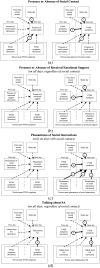The day-to-day relationship between posttraumatic stress symptoms and social support after sexual assault
- PMID: 38376992
- PMCID: PMC10880566
- DOI: 10.1080/20008066.2024.2311478
The day-to-day relationship between posttraumatic stress symptoms and social support after sexual assault
Abstract
Background: Experiencing sexual assault is associated with a significant increase in risk for developing posttraumatic stress disorder and related concerns (e.g. alcohol misuse). Cross-sectional and longitudinal evidence suggests that social support may be both broadly protective against and eroded by posttraumatic stress symptoms. However, little is known about how different aspects of social support and posttraumatic stress symptoms influence each other in the weeks and months immediately following sexual assault, when posttraumatic stress (PTS) symptoms first emerge.Objective: The present study assessed the day-to-day relationship between social support and PTS in a sample of distressed, alcohol-using, recently-assaulted female survivors participating in a clinical trial of an app-based intervention (N = 41).Method: Participants completed 3 weeks of daily diaries starting within 10 weeks of sexual assault. Mixed-effects models were used to examine prior-day and same-day relationships between PTS and four social support constructs (social contact, emotional support, pleasantness of social interactions, and talking about sexual assault).Results: Results indicate that higher quantity and pleasantness of social interactions over the full sampling period was associated with lower PTS symptoms on any given day. Experiencing better-than-typical social interactions on one day was associated with lower than typical PTS symptoms on that day and the next day. On days when participants discussed their sexual assault with others, they tended to be having higher than usual PTS symptoms.Conclusions: Findings suggest that increasing the quantity and pleasantness of social interactions soon after sexual assault might protect against worsening posttraumatic stress symptoms.Trial registration: ClinicalTrials.gov identifier: NCT03703258.
Antecedentes: La experiencia de agresión sexual se asocia con un aumento significativo en el riesgo de desarrollar un trastorno de estrés postraumático y preocupaciones relacionadas (por ejemplo, abuso de alcohol). Evidencia transversal y longitudinal sugiere que el apoyo social puede ser tanto un amplio protector, como también verse deteriorado por los síntomas de estrés postraumático. Sin embargo, poco se sabe sobre cómo diferentes aspectos del apoyo social y los síntomas de estrés postraumático se influyen mutuamente en las semanas y meses inmediatamente posteriores a una agresión sexual, cuando los síntomas de estrés postraumático (SEPT) aparecen por primera vez.
Objetivo: El presente estudio evaluó la relación diaria entre el apoyo social y los SEPT en una muestra de mujeres sobrevivientes angustiadas, usuarias de alcohol, recientemente agredidas, que participaron en un ensayo clínico de una intervención basada en una aplicación (N = 41).
Método: Las participantes completaron 3 semanas de registros diarios, comenzando dentro de las 10 semanas posteriores a la agresión sexual. Se utilizaron modelos de efectos mixtos para examinar las relaciones del día anterior y del mismo día entre los SEPT y cuatro constructos de apoyo social (contacto social, apoyo emocional, nivel de agrado en las interacciones sociales y hablar sobre la agresión sexual).
Resultados: Los resultados indican que una mayor cantidad y agrado de las interacciones sociales durante todo el período de muestreo, se asociaron con menores SEPT en un día determinado. Experimentar interacciones sociales mejores de lo habitual, en un día, se asoció con SEPT inferiores a lo habitual en ese día y al día siguiente. En los días en que las participantes conversaron de su agresión sexual con otros, tendían a tener SEPT más elevados de lo habitual.
Conclusiones: Los hallazgos sugieren que aumentar la cantidad y el nivel de agrado de las interacciones sociales poco después de una agresión sexual, podría proteger contra el empeoramiento de los síntomas de estrés postraumático.
Keywords: Agresión sexual; Sexual assault; acute post-trauma period; apoyo social; daily diary; estrés postraumático; período agudo post-trauma; posttraumatic stress; registros diarios; social support.
Plain language summary
In N = 41 distressed and alcohol-using female survivors of recent sexual assault, having a higher quantity of social interactions and more pleasant social interactions within 10 weeks of assault was associated with lower posttraumatic stress symptoms.When survivors’ social interactions were more pleasant than average on one day, their posttraumatic stress symptoms tended to be lower than average the next day, and recent survivors were more likely to talk about sexual assault on days when their posttraumatic stress symptoms were higher than usual.Interventionists should take note that increasing the quantity and pleasantness of social interactions soon after sexual assault might protect against worsening posttraumatic stress symptoms.
Conflict of interest statement
No potential conflict of interest was reported by the author(s).
Figures
References
-
- Bates, D., Mächler, M., Bolker, B., & Walker, S. (2015). Fitting linear mixed-effects models using lme4. Journal of Statistical Software, 67(1), 1–48. 10.18637/jss.v067.i01 - DOI
-
- Carter, S. P., DiMauro, J., Renshaw, K. D., Curby, T. W., Babson, K. A., & Bonn-Miller, M. O. (2016). Longitudinal associations of friend-based social support and PTSD symptomatology during a cannabis cessation attempt. Journal of Anxiety Disorders, 38, 62–67. 10.1016/j.janxdis.2016.01.008 - DOI - PubMed
MeSH terms
Associated data
Grants and funding
LinkOut - more resources
Full Text Sources
Medical

